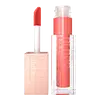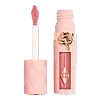Maybelline Lip Lifter Gloss Versus Charlotte Tilbury Pillow Talk Big Lip Plumpgasm Plumping Lip Gloss
What's inside
What's inside
 Key Ingredients
Key Ingredients

 Benefits
Benefits

 Concerns
Concerns

 Ingredients Side-by-side
Ingredients Side-by-side

C18-36 Acid Triglyceride
EmollientBis-Diglyceryl Polyacyladipate-2
EmollientPentaerythrityl Tetraisostearate
EmollientPolybutene
Tridecyl Trimellitate
EmollientDiisostearyl Malate
EmollientSilica Dimethyl Silylate
EmollientPhenoxyethanol
PreservativeEthylhexyl Palmitate
EmollientPentaerythrityl Tetra-Di-T-Butyl Hydroxyhydrocinnamate
AntioxidantEthylhexylglycerin
Skin ConditioningCalcium Sodium Borosilicate
Sorbic Acid
PreservativeCalcium Aluminum Borosilicate
Tocopheryl Acetate
AntioxidantSodium Saccharin
MaskingAlumina
AbrasiveSynthetic Fluorphlogopite
Silica
AbrasivePolybutylene Terephthalate
Trihydroxystearin
Skin ConditioningCocos Nucifera Oil
MaskingAluminum Hydroxide
EmollientEthylene/Va Copolymer
Emulsion StabilisingAcrylates Copolymer
Tin Oxide
AbrasiveMagnesium Silicate
AbsorbentSodium Hyaluronate
HumectantTocopherol
AntioxidantGlucomannan
Skin ConditioningParfum
MaskingCI 77891
Cosmetic ColorantCI 77491
Cosmetic ColorantCI 77492
Cosmetic ColorantCI 77499
Cosmetic ColorantMica
Cosmetic ColorantCI 15850
Cosmetic ColorantCI 45410
Cosmetic ColorantCI 15985
Cosmetic ColorantCI 42090
Cosmetic ColorantCI 17200
Cosmetic ColorantCI 45380
Cosmetic ColorantCI 19140
Cosmetic ColorantC18-36 Acid Triglyceride, Bis-Diglyceryl Polyacyladipate-2, Pentaerythrityl Tetraisostearate, Polybutene, Tridecyl Trimellitate, Diisostearyl Malate, Silica Dimethyl Silylate, Phenoxyethanol, Ethylhexyl Palmitate, Pentaerythrityl Tetra-Di-T-Butyl Hydroxyhydrocinnamate, Ethylhexylglycerin, Calcium Sodium Borosilicate, Sorbic Acid, Calcium Aluminum Borosilicate, Tocopheryl Acetate, Sodium Saccharin, Alumina, Synthetic Fluorphlogopite, Silica, Polybutylene Terephthalate, Trihydroxystearin, Cocos Nucifera Oil, Aluminum Hydroxide, Ethylene/Va Copolymer, Acrylates Copolymer, Tin Oxide, Magnesium Silicate, Sodium Hyaluronate, Tocopherol, Glucomannan, Parfum, CI 77891, CI 77491, CI 77492, CI 77499, Mica, CI 15850, CI 45410, CI 15985, CI 42090, CI 17200, CI 45380, CI 19140
Polybutene
Hydrogenated Polydecene
EmollientCaprylic/Capric Triglyceride
MaskingHydrogenated Didecene
Skin ConditioningDiisostearyl Malate
EmollientHydrogenated Styrene/Isoprene Copolymer
Silica Silylate
EmollientSynthetic Fluorphlogopite
Dicalcium Phosphate
AbrasiveMethyl Diisopropyl Propionamide
MaskingHelianthus Annuus Seed Oil
EmollientEthylhexyl Palmitate
EmollientEthyl Vanillin
MaskingTocopheryl Acetate
AntioxidantPentaerythrityl Tetra-Di-T-Butyl Hydroxyhydrocinnamate
AntioxidantCaprylyl Glycol
Emollient1,2-Hexanediol
Skin ConditioningVanillyl Butyl Ether
MaskingLupinus Albus Seed Extract
Skin ConditioningCapsicum Frutescens Resin
CleansingSilica Dimethyl Silylate
EmollientTocopherol
AntioxidantButylene Glycol
HumectantCanola Oil
EmollientPhenoxyethanol
PreservativeGlyceryl Stearates
EmollientSodium Hyaluronate
HumectantAscorbyl Palmitate
AntioxidantHexylene Glycol
EmulsifyingCI 77891
Cosmetic ColorantIron Oxides
CI 42090
Cosmetic ColorantCI 15850
Cosmetic ColorantPolybutene, Hydrogenated Polydecene, Caprylic/Capric Triglyceride, Hydrogenated Didecene, Diisostearyl Malate, Hydrogenated Styrene/Isoprene Copolymer, Silica Silylate, Synthetic Fluorphlogopite, Dicalcium Phosphate, Methyl Diisopropyl Propionamide, Helianthus Annuus Seed Oil, Ethylhexyl Palmitate, Ethyl Vanillin, Tocopheryl Acetate, Pentaerythrityl Tetra-Di-T-Butyl Hydroxyhydrocinnamate, Caprylyl Glycol, 1,2-Hexanediol, Vanillyl Butyl Ether, Lupinus Albus Seed Extract, Capsicum Frutescens Resin, Silica Dimethyl Silylate, Tocopherol, Butylene Glycol, Canola Oil, Phenoxyethanol, Glyceryl Stearates, Sodium Hyaluronate, Ascorbyl Palmitate, Hexylene Glycol, CI 77891, Iron Oxides, CI 42090, CI 15850
 Reviews
Reviews

Ingredients Explained
These ingredients are found in both products.
Ingredients higher up in an ingredient list are typically present in a larger amount.
Ci 15850 is the pigment color red. It is an azo dye and created synthetically.
Azo dyes need to be thoroughly purified before use. This allows them to be more stable and longer-lasting.
This ingredient is common in foundations, lipsticks, and blushes. This color is described as brown/orangey red.
It has many secondary names such as Red 6 and Red 7. According to a manufacturer, Red 6 usually contains aluminum.
Learn more about CI 15850Ci 42090 is a synthetic dye created from petroleum. It is used to give a bright blue color to cosmetics, medicine, and food.
Ci 77891 is a white pigment from Titanium dioxide. It is naturally found in minerals such as rutile and ilmenite.
It's main function is to add a white color to cosmetics. It can also be mixed with other colors to create different shades.
Ci 77891 is commonly found in sunscreens due to its ability to block UV rays.
Learn more about CI 77891Diisostearyl Malate is an emollient and most often used in lip products. It comes from isostearyl alcohol, a fatty acid, and malic acid, an AHA.
As an emollient, Diisostearyl Malate helps create a thin film on your skin to trap moisture in. This helps keep your skin soft and smooth.
Ethylhexyl Palmitate, also known as octyl palmitate, is created from 2-ethylhexyl alcohol and palmitic acid. It is a fatty acid ester.
The fatty acid content of Ethylhexyl Palmitate makes it an emollient. Emollients help soften and hydrate your skin by trapping moisture within.
Ethylhexyl Palmitate is also used to help improve the texture of cosmetics. It helps other ingredient dissolve in products and help disperse ingredients more evenly.
You'll likely find this ingredient in sunscreen, as it is often used to mix UV-blocking ingredients such as avobenzone and ethylhexyl triazone.
It can also help stabilize the fragrances in a product as a fragrance fixative.
Ethylhexyl Palmitate can be used to substitute mineral oil.
Due to its high fatty acid content, it may not be fungal-acne safe.
Learn more about Ethylhexyl PalmitatePentaerythrityl Tetra-Di-T-Butyl Hydroxyhydrocinnamate (long name, huh?) is a synthetic antioxidant.
It is used to help stabilize other antioxidants or prevent the color from changing in a product.
As an antioxidant, it helps fight free-radical molecules. Free-radical molecules are capable of damaging our cells and other genetic material. Thus, antioxidants may reduce the signs of aging.
This ingredient is oil-soluble.
Learn more about Pentaerythrityl Tetra-Di-T-Butyl HydroxyhydrocinnamatePhenoxyethanol is a preservative that has germicide, antimicrobial, and aromatic properties. Studies show that phenoxyethanol can prevent microbial growth. By itself, it has a scent that is similar to that of a rose.
It's often used in formulations along with Caprylyl Glycol to preserve the shelf life of products.
Polybutene is used to help control the viscosity of a product. This just means it helps adjusts the texture.
It is a polymer and does not get absorbed into the skin due to its large size.
Studies found this ingredient did not irritate skin in concentrations below 15%.
Learn more about PolybuteneThis silica is mainly used to thicken oils and suspend particles in oils. It is not water soluble.
According to the manufacturer, it:
The manufacturer also claims this ingredient to be useful in makeup.
In lipstick formulations, this ingredient improves color payoff, reduces pigment settling, and reduces oil bleeding. This ingredient also improves the grip of powder products such as dry shampoos.
Learn more about Silica Dimethyl SilylateSodium Hyaluronate is hyaluronic acid's salt form. It is commonly derived from the sodium salt of hyaluronic acid.
Like hyaluronic acid, it is great at holding water and acts as a humectant. This makes it a great skin hydrating ingredient.
Sodium Hyaluronate is naturally occurring in our bodies and is mostly found in eye fluid and joints.
These are some other common types of Hyaluronic Acid:
Learn more about Sodium HyaluronateSynthetic Fluorphlogopite is the synthethic version of mica. It consists of fluorine, aluminum and silicate.
Synthetic Fluorphlogopite is used to add volume to products.
It is considered non-irritating on the skin.
Learn more about Synthetic FluorphlogopiteTocopherol (also known as Vitamin E) is a common antioxidant used to help protect the skin from free-radicals and strengthen the skin barrier. It's also fat soluble - this means our skin is great at absorbing it.
Vitamin E also helps keep your natural skin lipids healthy. Your lipid skin barrier naturally consists of lipids, ceramides, and fatty acids. Vitamin E offers extra protection for your skin’s lipid barrier, keeping your skin healthy and nourished.
Another benefit is a bit of UV protection. Vitamin E helps reduce the damage caused by UVB rays. (It should not replace your sunscreen). Combining it with Vitamin C can decrease sunburned cells and hyperpigmentation after UV exposure.
You might have noticed Vitamin E + C often paired together. This is because it is great at stabilizing Vitamin C. Using the two together helps increase the effectiveness of both ingredients.
There are often claims that Vitamin E can reduce/prevent scarring, but these claims haven't been confirmed by scientific research.
Learn more about TocopherolTocopheryl Acetate is AKA Vitamin E. It is an antioxidant and protects your skin from free radicals. Free radicals damage the skin by breaking down collagen.
One study found using Tocopheryl Acetate with Vitamin C decreased the number of sunburned cells.
Tocopheryl Acetate is commonly found in both skincare and dietary supplements.
Learn more about Tocopheryl Acetate